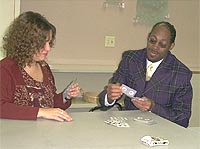Coping with Cognitive Issues
 HIV-related cognitive/motor disorders include a range of increasingly severe central nervous system complications associated with HIV. HIV-associated neurocognitive disorders (HAND) range from mild problems with memory, language, and reasoning to the more severe HIV-associated dementia (HAD) (HAND, n.d.).
HIV-related cognitive/motor disorders include a range of increasingly severe central nervous system complications associated with HIV. HIV-associated neurocognitive disorders (HAND) range from mild problems with memory, language, and reasoning to the more severe HIV-associated dementia (HAD) (HAND, n.d.).
- David has difficulty keeping track of a conversation; he loses his concentration and cannot recall what was said..
- Rosalita gets confused about how to get to the drug store on her corner. Once she gets there, she drops off her prescription and forgets to pick it up.
- Terrel gets up from watching TV and goes into the kitchen to get something to eat. Once in the kitchen, he wonders what he is doing in there
- Monique cannot seem to shake her lethargy despite receiving mental health treatments. She fatigues easily and has weakness in her muscles.
- John went to the doctor four months ago. He spoke clearly and said he was taking his medication regularly. This month, John missed two appointments and then arrived an hour late at the doctor's office. He was anxious, his speech was unclear, and he had difficulty communicating his thoughts.
Mild cognitive changes often wax and wane. It is common for a client to display memory loss during one appointment and then normal cognitive functioning on the next. Changes in cognition may result from nerve loss, opportunistic infection, medications, depression, mental illness, anxiety, or substance use, etc.
Strict compliance with combined antiretroviral therapy (cART) regimens may be the most effective means to delay and, in some cases, reverse the progression of HIV-associated neurocognitive disorders (cART n.d.). When failing memory affects cART compliance, behavioral compensatory strategies can help the patient monitor and remember medication schedules. Expanding the treatment team to include a neuropsychology clinician may improve the patient's ability to recoup lost cognitive function through the implementation of a restorative memory treatment plan.
Reference
Combined Antiretroviral Therapy (ART): NIH. Antiretroviral Therapy (cART) | NIH. (n.d.). https://clinicalinfo.hiv.gov/en/glossary/antiretroviral-therapy-art
HIV Associated neurocognitive disorders (hand): NIH. HIV. (n.d.). https://clinicalinfo.hiv.gov/en/glossary/hiv-associated-neurocognitive-disorders-hand
 HIV-related cognitive/motor disorders include a range of increasingly severe central nervous system complications associated with HIV. HIV-associated neurocognitive disorders (HAND) range from mild problems with memory, language, and reasoning to the more severe HIV-associated dementia (HAD) (HAND, n.d.).
HIV-related cognitive/motor disorders include a range of increasingly severe central nervous system complications associated with HIV. HIV-associated neurocognitive disorders (HAND) range from mild problems with memory, language, and reasoning to the more severe HIV-associated dementia (HAD) (HAND, n.d.).